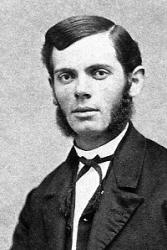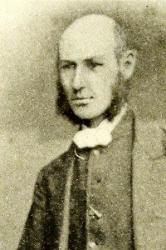Planning worship?
Check out our sister site, ZeteoSearch.org,
for 20+ additional resources related to your search.
- |
User Links
Person Results
Frances Elizabeth Cox
1812 - 1897 Person Name: Frances E. Cox Translator of "O let him whose sorrow" in The Evangelical Hymnal Cox, Frances Elizabeth, daughter of Mr. George V. Cox, born at Oxford, is well known as a successful translator of hymns from the German. Her translations were published as Sacred Hymns from the German, London, Pickering. The 1st edition, pub. 1841, contained 49 translations printed with the original text, together with biographical notes on the German authors. In the 2nd edition, 1864, Hymns from the German, London, Rivingtons, the translations were increased to 56, those of 1841 being revised, and with additional notes. The 56 translations were composed of 27 from the 1st ed. (22 being omitted) and 29 which were new. The best known of her translations are "Jesus lives! no longer [thy terrors] now" ; and ”Who are these like stars appearing ?" A few other translations and original hymns have been contributed by Miss Cox to the magazines; but they have not been gathered together into a volume.
-- John Julian, Dictionary of Hymnology (1907)
Frances Elizabeth Cox
John Bacchus Dykes

1823 - 1876 Composer of "MARY MAGDALENE (Dykes)" in The Cyber Hymnal As a young child John Bacchus Dykes (b. Kingston-upon-Hull' England, 1823; d. Ticehurst, Sussex, England, 1876) took violin and piano lessons. At the age of ten he became the organist of St. John's in Hull, where his grandfather was vicar. After receiving a classics degree from St. Catherine College, Cambridge, England, he was ordained in the Church of England in 1847. In 1849 he became the precentor and choir director at Durham Cathedral, where he introduced reforms in the choir by insisting on consistent attendance, increasing rehearsals, and initiating music festivals. He served the parish of St. Oswald in Durham from 1862 until the year of his death. To the chagrin of his bishop, Dykes favored the high church practices associated with the Oxford Movement (choir robes, incense, and the like). A number of his three hundred hymn tunes are still respected as durable examples of Victorian hymnody. Most of his tunes were first published in Chope's Congregational Hymn and Tune Book (1857) and in early editions of the famous British hymnal, Hymns Ancient and Modern.
Bert Polman
John Bacchus Dykes
Anonymous
Person Name: Unknown Composer of "CLEWER" in The Book of Praise In some hymnals, the editors noted that a hymn's author is unknown to them, and so this artificial "person" entry is used to reflect that fact. Obviously, the hymns attributed to "Author Unknown" "Unknown" or "Anonymous" could have been written by many people over a span of many centuries.
Anonymous
Friedrich Filitz
1804 - 1876 Person Name: F. Filitz, 1804-76 Composer of "CASWALL (WEM IN LEIDENSTAGEN)" in Songs of Praise Friedrich Filitz PhD Germany 1804-1876. Born at Arnstadt. Thuringia, he was a German composer and musicologist. He collected church music. He also studied philosophy. In 1833 he worked in Berlin as a music critic and at other employment. He was also a music historian. With Ludwig Erck, he published a collection of 15th & 17th Century chorales in 1845. He moved to Munich and published a chorale book in 1847. His legacy of vauable church music was donated to the Bavarian State Library, where it has made many forgotten works available once again. He died in Bonn, Germany.
John Perry
Friedrich Filitz
Spencer Lane

1843 - 1903 Composer of "PENITENCE" in The Evangelical Hymnal Spencer Lane USA 1843-1903. Born at Tilton, NH, he served in the 8th NH Infantry during the American Civil War. After the war, he studied at the New England Conservatory and taught vocal and instrumental music at Oneida and Utica, NY. He married Isabel F. (no information on children was found). He later moved to Woonsocket, RI, where he ran a music store and served as organist and directed the choir for the St. James Episcopal Church for 13 years. He moved to Monson, MA, then to Richmond, VA, and in 1896 to Baltimore, MD. In Baltimore he worked for the music firm of Sanders & Stayman and was music director at the All Saints Protestant Episcopal Church. While at Woonsocket, his pastor gave him the hymns for an evening service, one of whose tune he didn’t care for, so he composed another tune for it, ‘Penitence’. That is his only hymn contribution. He was an author and music composer: “My beloved, I’ll think of thee”, “A dream – grand march”, others. He died at Reedville, VA.
John Perry
Spencer Lane
Heinrich S. Oswald
1751 - 1834 Author of "O let him whose sorrow" in The Evangelical Hymnal Oswald, Heinrich Siegmund, son of Johann Heinrich Oswald or Osswald, of Nimmersatt, near Liegnitz, in Silesia, was born at Nimmersatt, June 30, 1751. After passing through the school at Schmiedeberg he was for seven years clerk in a public office at Breslau. In 1773 he became Secretary to the Landrath von Prittwitz at Glatz, with whom he remained two years, and was thereafter in business at Hamburg and at Breslau. Through J. D. Hermes, Oberconsistorialrath at Potsdam, whose daughter he married, he became acquainted with King Friedrich Wilhelm II. of Prussia, and in 1791 was appointed reader to the king. He accordingly removed to Potsdam, and was in 1791 appointed also Geheimrath. After the king's death, on Nov. 16, 1797, Oswald received a pension, and retired first to Hirschberg, and then to Breslau, where he died Sept. 8, 1834. (Allgemeine Deutsche Biographie xxiv. 528; Miller's Singers & Songs, 1869, p. 303; extracts from the Breslauer Zeitung, Sept. 12, 1834, and the Schlesische Provinzialblätter, 1835, p. 289, kindly communicated by Dr. Markgraf of the Breslau Stadt Bibliothek, &c.)
Oswald's hymns, over 100 in all, appeared principally in his (1) Unterhaltungen für gläubige Seelen, Berlin, 1792. (2) Gedichte und Lieder fürs Herz, Berlin, 1793. (3) Letzten Mittheilungen meiner der Wahrheit und Religion geweihter Muse, Breslau, 1826. (4) Schwanengesänge, Breslau, n.d. (preface Aug. 1827).
Three or four of Oswald's hymns have passed into German hymnbooks. One has been translated into English, viz.:—
Wem in Leidenstagen. For Mourners. In his Letzte Mittheilungen, 1826, p. 42, in 14 stanza of 4 lines, and entitled "An exhortation to Tranquillity. To the Suffering. Psalm 50, v. 15." Bunsen, in his Versuch, 1833, No. 813 (Allgemeine Gesangbuche, 1846, No. 333), selects st. i.-iii., x., xii.-xir. The singing of this beautiful hymn (in Miss Cox's version) formed an impressive part of the service in the church at Edensor at the funeral of Lord Frederick Cavendish, May 11, 1882. Translated as:—
1. 0! Let him whose sorrow. A very good translation from Bunsen's text, by Miss Cox, in her Sacred Hymns from the German, 1841… included in Alford's Psalms & Hymns, 1844, and others…. Another translation is: "When in thine hours of grief," by Lady E. Fortescue, 1843, p. 71. [Rev. James Mearns, M.A.]
--Excerpts from John Julian, Dictionary of Hymnology (1907)
Heinrich S. Oswald
Timothy R. Matthews

1826 - 1910 Person Name: T. R. Matthews Composer of "RHOSSILLY" in The New Laudes Domini Timothy Richard Matthews MusB United Kingdom 1826-1910. Born at Colmworth, England, son of the Colmworth rector, he attended the Bedford and Gonville Schools and Caius College, Cambridge. In 1853 he became a private tutor to the family of Rev Lord Wriothesley Russell, a canon of St. George’s Chapel, Windsor Castle, where he studied under organist, George Elvey, subsequently a lifelong friend. He married Margaret Mary Thompson, and they had 11 children: Norton, Mary, George, Cecil, Evelyn, Eleanor, Anne, Arthur, Wilfred, Stephen, and John. Matthews served as Curate and Curate-in-Charge of St Mary’s Church, Nottingham (1853-1869). While there, he founded the Nottingham Working Men’s Institute. He became Rector at North Coates, Lincolnshire (1869-1907). He retired in 1907 to live with his eldest son, Norton, at Tetney vicarage. He edited the “North Coates supplemental tune book” and “Village organist”. An author, arranger, and editor, he composed morning and evening services, chants, and responses, earning a reputation for simple but effective hymn tunes, writing 100+. On a request he wrote six tunes for a children’s hymnal in one day. He composed a Christmas carol and a few songs. His sons, Norton, and Arthur, were also known as hymn tune composers. He died at Tetney, Lincolnshire, England.
John Perry
Timothy R. Matthews
Oswald Mosley Feilden

1837 - 1924 Person Name: O. M. Feilden Composer of "ST. JOHN BAPTIST" in The Church Hymnary Born: September 16, 1837, Canterbury, England.
Died: June 19, 1924, Oswestry, England.
Buried: St. Andrew’s Church, Welsh Frankton, Ellesmere, Shropshire, England.
Feilden graduated from Christ Church College, Oxford, in 1859, and in 1861 became assistant Curate at Whittington, Shropshire, under William How. In addition to his pastoral duties, Feilden was a keen botanist, and was president of the Offa Field Club (a local botanical group formed in 1888), and was responsible for much of the data and population work on wild flowers in the locality. His colleague Thomas Diamond published Flora of Oswestry, their account of the botany of the area, in 1891, though it seems Feilden was the botanist while Diamond was the collator. The book included the first recording of Mountain Everlasting (Antennaria dioica) on Llanymynech Hill, Juniper (Juniperus communis) at Carregybig and Creeping Willow (Salix repens) at Glopa.
--www.hymntime.com/tch
Oswald Mosley Feilden
Albert J. Holden
1841 - 1916 Person Name: A. J. H. Composer of "[Oh, let him whose sorrow]" in Songs of Faith, Hope, and Love A Founder of the American Guild of Organists and composer and editor of numerous pieces and collections of sacred music (of which perhaps Songs of Faith, Hope and Love, 1883, is best known), Albert Junos Holden was born in Boston on August 17, 1841. He studied in New York City, and served there as organist of the Church of the Divine Paternity (Universalist) and of the Church of the Puritans (Presbyterian). His sacred solo "In Heavenly Love Abiding" was recorded by the "Metropolitan Quartet" on an Edison Blue Amberol cylinder, No. 3813, in 1919. He died in Longmeadow, Massachusetts, on July 16, 1916.
(source: AGO Founders Hymnal, p. 98)
Albert J. Holden
A. Edmonds Tozer
1857 - 1919 Person Name: A. E. Tozer Composer of "EVENING SHADOWS" in Praise Songs
A. Edmonds Tozer
Mrs. S. Cooper
Composer of "[Oh, let him, whose sorrow]" in Hymns of Consecration and Faith
Mrs. S. Cooper


 My Starred Hymns
My Starred Hymns


